In the first post of this series we looked at Dominion and its role in establishing the deck building card game format. In the second post we looked at the challenger to the throne, Thunderstone. In this post we explore what happens when three professional Magic players get into the act and create the game Ascension: Chronicle of the Godslayer.
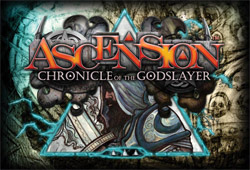 Ascension: Chronicle of the Godslayer was published in 2010 by Gary Games and designed by Magic Pro Tour champions Justin Gary, Rob Dougherty, and Brian Kibler. In Ascension 2 to 4 players start with a small army of Apprentices (providing runes, a magical currency for buying other cards) and Militia (power cards used to defeat monsters). The goal is to build up that army and accumulate the most honor points, either by defeating monsters or by purchasing other valuable cards.
Ascension: Chronicle of the Godslayer was published in 2010 by Gary Games and designed by Magic Pro Tour champions Justin Gary, Rob Dougherty, and Brian Kibler. In Ascension 2 to 4 players start with a small army of Apprentices (providing runes, a magical currency for buying other cards) and Militia (power cards used to defeat monsters). The goal is to build up that army and accumulate the most honor points, either by defeating monsters or by purchasing other valuable cards.
Once again, at first glance game play is very similar to Dominion. Players start with identical personal decks of 10 cards each from which they draw a hand of 5. However, where Dominion and Thunderstone offer the same cards for purchase to all players throughout the game, Ascension features 6 cards on a game board which are constantly replaced as players buy or defeat each card.
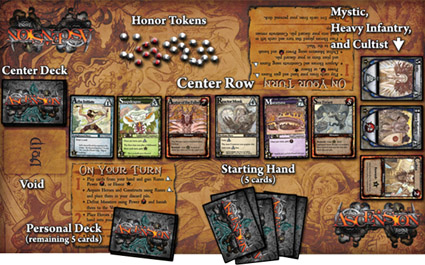
Being designed by professional Magic players it is perhaps no surprise that Ascension shows a clear heritage from that game. Ascension is the only deck building game in this series where a class of cards, Constructs, is brought into play and remains in play from turn to turn unless eliminated by further card play (similar to creature summoning in Magic). Ascension also features cards divided into four factions, each with a distinctive style of play, reminiscent of Magic’s use of color. Lastly, while both Dominion and to a lesser extent, Thunderstone feature card combos, the card combos in Ascension have been designed into the game from the ground up although with mixed success.
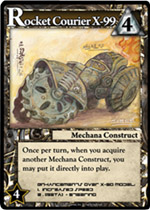 The art and graphic design for Ascension have been somewhat controversial. In a departure from other card games, Ascension features the work of a single artist, Eric Sabee, for a consistent look throughout the game. The art is somewhat abstract with distorted proportions and an illustrated pencil look reminiscent of the art from Heavy Metal magazine dating back to the 70’s. I love the look of this game. It’s refreshing to see something different yet vaguely familiar after nearly 20 years of Magic style art but it is not what everyone has come to expect for a fantasy based card game.
The art and graphic design for Ascension have been somewhat controversial. In a departure from other card games, Ascension features the work of a single artist, Eric Sabee, for a consistent look throughout the game. The art is somewhat abstract with distorted proportions and an illustrated pencil look reminiscent of the art from Heavy Metal magazine dating back to the 70’s. I love the look of this game. It’s refreshing to see something different yet vaguely familiar after nearly 20 years of Magic style art but it is not what everyone has come to expect for a fantasy based card game.
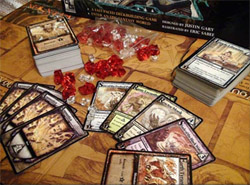 Overall, Ascension is the easiest and fastest playing of the deck building games discussed in this series. I’ve enjoyed each round I’ve played, however, for now; Dominion still gets the nod for the most polished game play. Ascension’s tightly coupled card combos are both a blessing and a curse. I’ve been involved in more than one game of Ascension that has ended early because one player managed to assemble an unstoppable force by mid-game.
Overall, Ascension is the easiest and fastest playing of the deck building games discussed in this series. I’ve enjoyed each round I’ve played, however, for now; Dominion still gets the nod for the most polished game play. Ascension’s tightly coupled card combos are both a blessing and a curse. I’ve been involved in more than one game of Ascension that has ended early because one player managed to assemble an unstoppable force by mid-game.
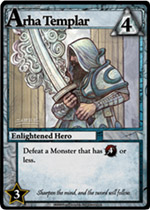 Ascension has also been accused of being highly luck dependent. Where other deck building games provide players with equal access to each card, the cards in play for Ascension are constantly changing. It’s entirely possible that cards critical to one player’s strategy can be snapped up by other players and replaced with less useful cards. When approached as a light, casual game I don’t find these issues that distracting. Ascension is short, easy to reset, and still fun to play despite its shortcomings, however, highly competitive players that care deeply about balance will probably want to look elsewhere.
Ascension has also been accused of being highly luck dependent. Where other deck building games provide players with equal access to each card, the cards in play for Ascension are constantly changing. It’s entirely possible that cards critical to one player’s strategy can be snapped up by other players and replaced with less useful cards. When approached as a light, casual game I don’t find these issues that distracting. Ascension is short, easy to reset, and still fun to play despite its shortcomings, however, highly competitive players that care deeply about balance will probably want to look elsewhere.
Next post: A deck building game based on the Resident Evil video games…seriously?
Ascension: Chronicle of the Godslayer may be found at your full service local game store, from Amazon.com for about $36.67, and from many other online retailers.
When not playing games, Bob Gallo is a computer programmer specializing in Flash and interactive application design living in the Charlotte, NC area. Bob got his gaming start in the mid 1970s with traditional hex-and-counter war games and has played nearly all types of games including role playing games, miniatures, collectible card games, video/PC games as well as traditional board and card games.










